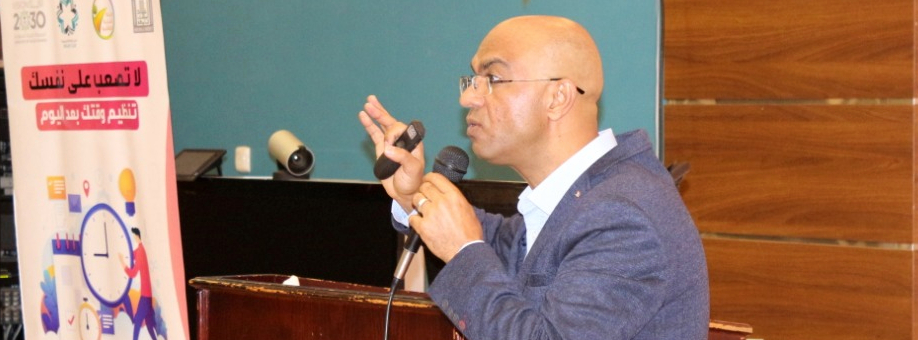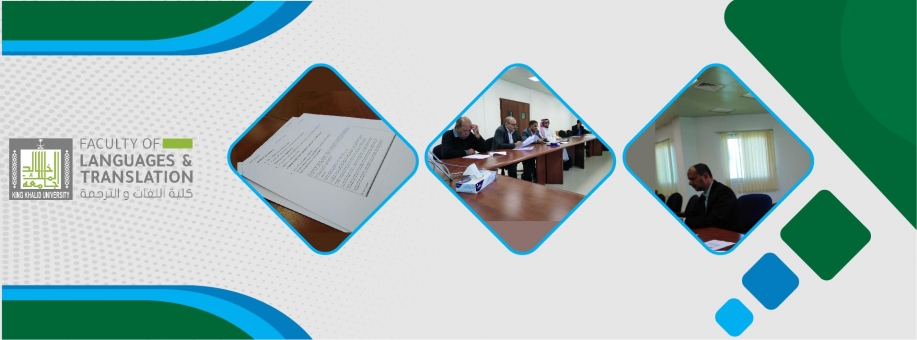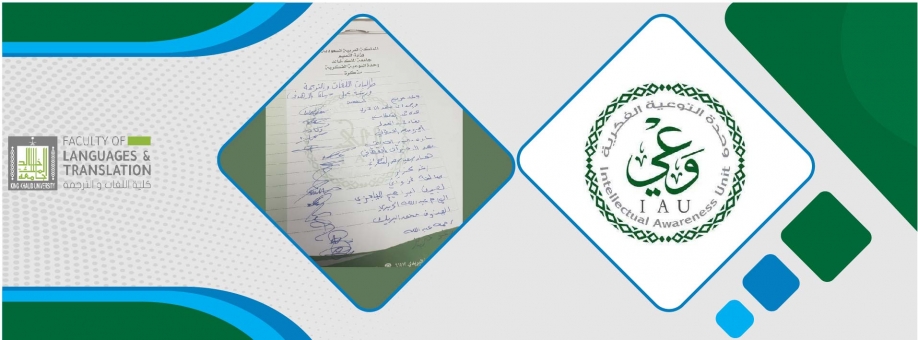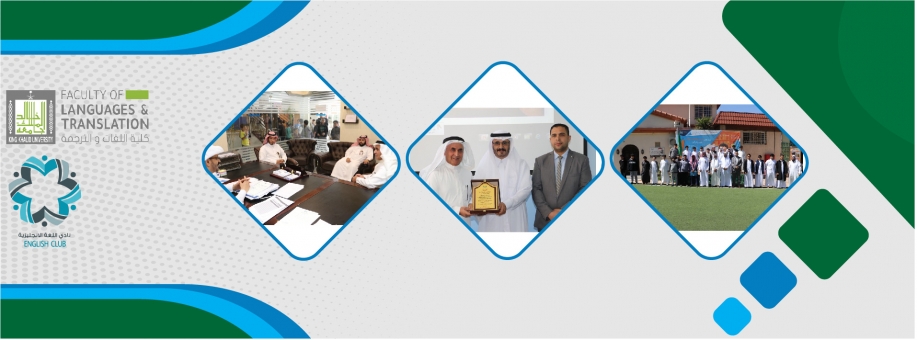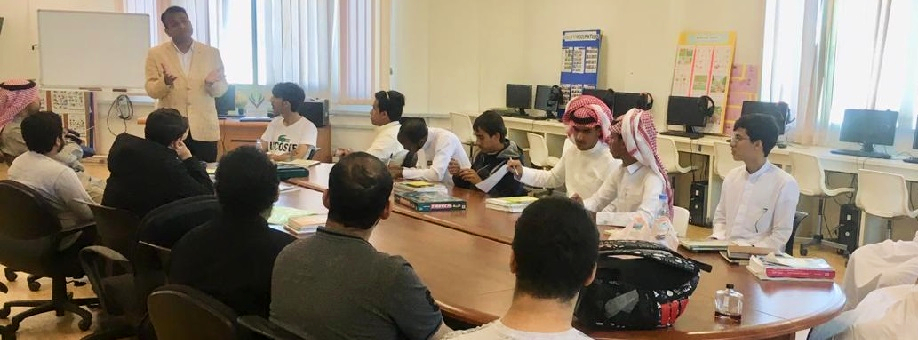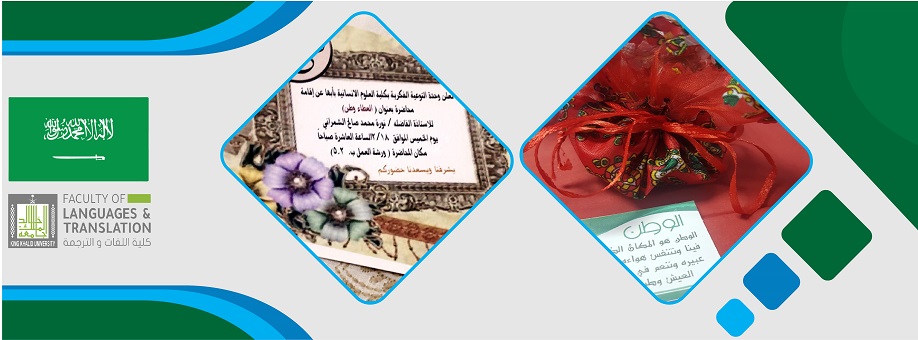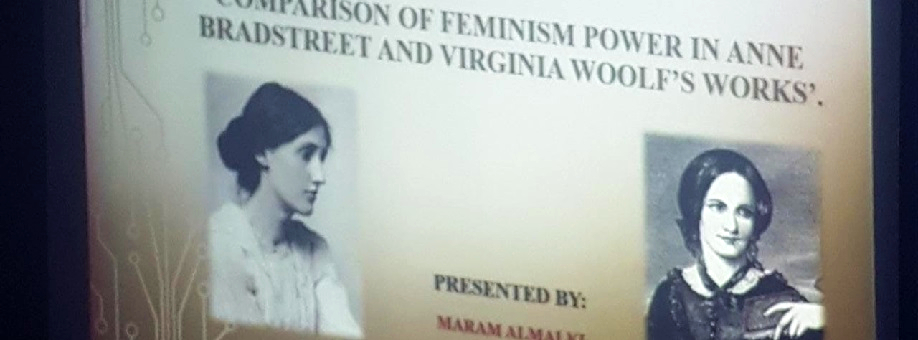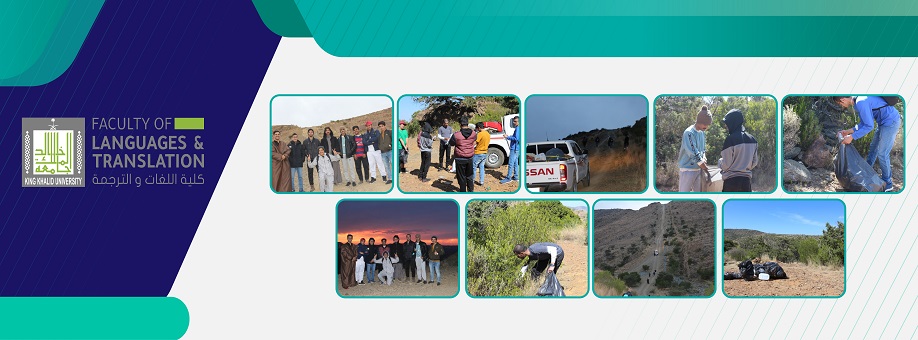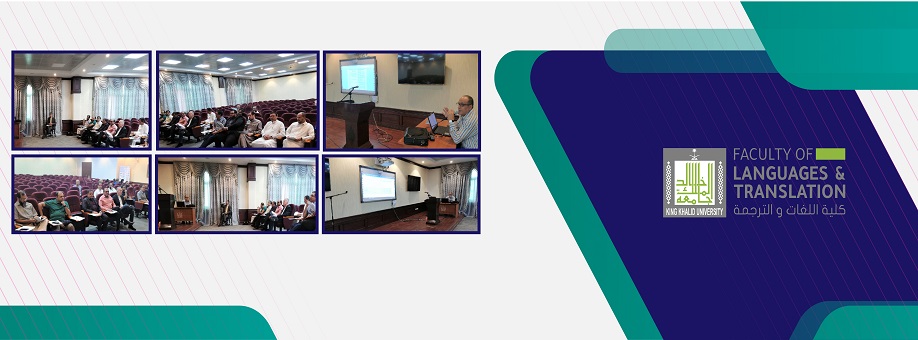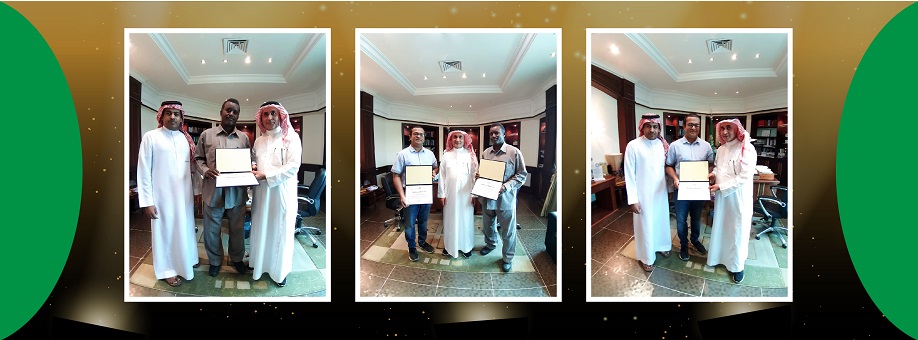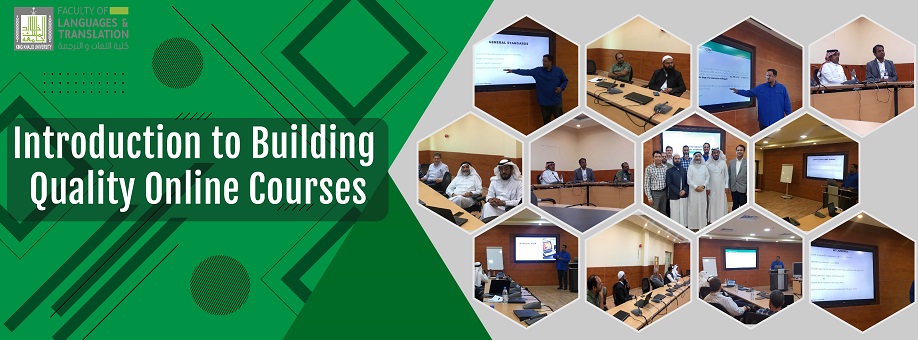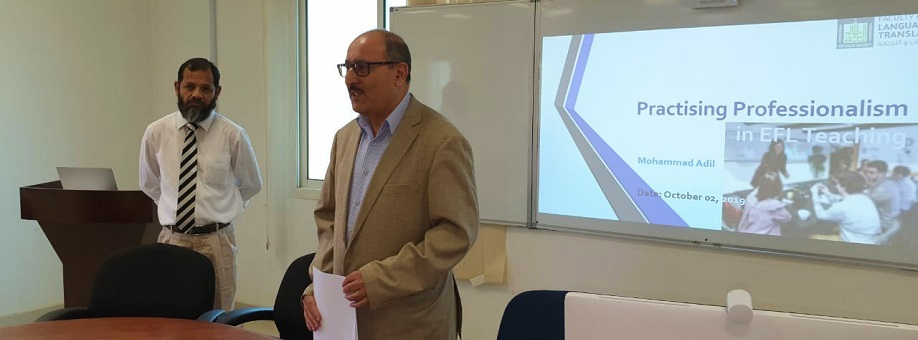News
On October 29, 2019, the English Club organized a workshop titled 'Stress and Time Management' delivered by Dr. Karem Abdelatif Ahmed. The purpose of the workshop was to show the students how to manage the effects of stress and maintain high levels of work performance under stressful circumstances.
Academic Guidance Counselor, Dr. Dawood Mahdi, started the event with a speech encouraging the students to attend programs devoted to academic performance enhancement. He recounted his own experiences in managing his personal and academic obligations while in school.
Dr. Ahmed then began his program. He told the students that stressors of one sort or another are inherent in every stage of life. He noted that stress increases with age and increased professional responsibilities. Dr. Ahmed opined that the most important thing about stress is maintaining perspective. That is, not viewing every adverse situation as a crisis. We should strive to do our best to respond to stressful circumstances with diligence and grace, knowing that controlling every outcome is impossible. He also reviewed the unhealthy physical and psychological effects of long-term exposure to heavy stress. In short, he admonished the students to be studious and hard-working and to never forget that they cannot bear the weight of the entire world.
Dr. Ahmed then moved on to the issue of time. He stated that many books and countless hours of effort have gone into studying 'time management'. He noted that there is no such thing as managing time. Time marches relentlessly forward regardless of our needs or desires. Rather, one can only manage their priorities. Dr. Abdullateef stated his strategy: Set both short-term and long-term goals, and reduce them to writing. Set the objectives high, but not unrealistically so and give a target date for each. Make sure that the vast majority of your time is devoted to those goals, and track your progress daily. Avoid those activities that keep you 'busy' on things that are unimportant or frivolous. In short, focus and monitor on that which is truly important so that small daily activities turn into huge accomplishments over the long term.
Near the conclusion of the program, English Club Director Faisal Alfadhil spoke about how students can use the English Club's social media accounts to stay connected. He encouraged the students to join the club's WhatsApp group and connect with their classmates.
The Faculty of Languages and Translation is committed to providing world-class language education and empowering the students with the tools to succeed in challenging academic programs.
Date: 10/30/2019
Source: Faculty of Languages and Translation
Dr. Khairiya Abudadi conducted a workshop on Rbrul Statistics, at the seminar organized by the Language Research Center, FLT of King Khalid University, on October 30, 2019.
Rbrul Statistics, Abudadi said, is a user-friendly piece of software that allows us to calculate statistical data very easily. She first focused on the application’s installation. After that, she talked about various features of Rbrul Statistics and its application to teaching and assessment in different department courses. She also mentioned how useful the application had been during her Ph.D.
She concluded that Rbrul Statistics is a very useful piece of software that helps with data analysis and complicated statistical calculation. She recommended that we all try to use it for statistical analysis.
The workshop was informative and an overall success. Graigor campus also participated in the workshop.
Date: 10/30/2019
Source: Mohammad Adil Siddique
The English Club of the Faculty of Languages and Translation - female section - conducted a Speech Competition. The audition day was on Monday 29/10/2019, and three students were nominated to the Finals, on Wednesday 30/10/2019. The English Club prepared a corner and evaluation forms for six judges from the Faculty. The Faculty members were responsible for evaluating contestants' performance, and they had the eligibility of 80% of the marks. Whereas, the audiences’ votes presented the remaining 20%.
After the final speeches, the English Club coordinator and judges calculated the marks and votes then announced the winners and distributed Certificates and Vouchers from Jarir Bookstore. It was a strong competition with interesting topics and performances.
Date: 10/30/2019
Source: Ms. Maram Almalki, Student Affairs Coordinator
The students of the Faculty of Languages and Translation (female section), along with the coordinator of the Intellectual Awareness Unit (IAU), attended a workshop on Thursday, October 24, 2019, at Faculty of Islamic Legislation. The workshop was held by Dr. Nora Al-Faifi, who emphasized the importance of setting life goals and working hard to achieve them. "Life has many challenges, and you should set goals, find opportunities, overcome all obstacles, and work hard to achieve your goal," said Dr. Al-Faifi. Goal setting isn't just about creating a plan for your life and holding yourself accountable; it's also about having the necessary inspiration to aim for things you never thought possible, explained Dr. Al-Faifi. She added that having a goal written down with a date for accomplishment gives you something to plan and work towards. A written goal is an abiding reminder of what you need to accomplish, which connects you with your inner desires, and gives you motivational energy to exert all efforts to achieve your goal.
In answering the question, "What is your life purpose, and how do you plan to achieve your dreams?", Dr. Al-Faifi clarified that the Islamic creed is very clear; we have been created to worship Allah the Almighty. Moreover, Allah intended for Muslims to be active participants in society and hence commanded us to go out in the world to seek out the bounties of Allah. Dr. Al-Faifi emphasized that setting goals in life, planning one's future and designing one's own purpose in life is all a part of the Islamic teachings.
The workshop was followed by an open discussion about the significance of setting a goal in one's life. Many participants contributed by talking about personal experiences they went through and the struggles they had in their lives and how they were able to overcome obstacles to achieve their goals. Finally, the workshop was concluded with success stories of some teaching assistants and students who managed to accomplish their goals. They asserted that it is very important to set a goal in your life, 'invite' opportunities, believe in yourself, and work hard to achieve your dream. The workshop was very motivational for students who were excited about the discussion and the success stories.
The event was attended by the Vice Supervisor of the Intellectual Awareness Unit, Dr. Dawlah Mohammad Mane', and IAU coordinators from various faculties of the university.
Date: 10/28/2019
Source: Dr. Amal Metwally, Coordinator of Intellectual Awareness Unit, Faculty of Languages and Translation
During the week of October 20, 2019, the English Club organized a trip to the 'Excellent Educational Schools' located in Abha. Dean Abdullah Al-Melhi, English Club Director Faisal Alfadhil, and club member Ali Al-Jasser represented the Faculty of Languages and Translation (FLT).
After a warm welcome by the packed audience of primary school students and Principal, Abdullah Al-Mualwi, Dean Al-Melhi thanked the school for inviting the FLT and the English Club. Dean Al-Melhi began with his speech stressing the importance of education and the many ways in which learning the English language can benefit them. He noted that learning is a lifelong process and that they should take their studies very seriously if they want to be successful in life. Following the dean, Director Alfadhil delivered a speech in which he spoke about the importance of hard work. He said, “Like many of you, when I was young, playing with my friends was more important than studying. However, as I got older, I understood the importance of school and learning English.” Principal Al-Mualwi then commented that the FLT representatives are role models and an inspiration to these young students to embrace education as the biggest opportunity in their young lives. He then awarded all of the FLT representatives, as mentioned above, a plaque recognizing their effort and commitment to education.
The FLT is committed to serving the community and encouraging advanced education among all segments of the population.
Date: 10/26/2019
Source: Faculty of Languages and Translation
أقام نادي { The English club } بكلية اللغات والترجمة بأبها - بالتعاون مع وكالة عمادة شؤون الطلاب لشؤون الطالبات بتنسيق مكتبة وركن قراءة للنادي.
حيث أفتتح النادي يوم الأربعاء الموافق ١٤٤١/٢/٢٤هـ مكتبة في قسم اللغات والترجمة بعد جهد وتنسيق من الطالبات دام لثلاثة أسابيع.
كما نسقت عضوات النادي ديكور المكتبة بأعمال يدوية وإعادة تدوير ثم تم جمع تبرعات الكتب لبدأ المكتبة وركن للقراءة. تتضمن المكتبة أرفف الكتب وطاولة للقراءة وركن القهوة وكذلك ركن استرخاء، أيضاً ركن رسائل يومية تحفيزية وسيتم تجديد محتواها إسبوعيا. كما تم تجهيز جدول لأوقات فتح المكتبة وتكفلت عضوات النادي بتقسيم أوقاتهن للإشراف على المكتبة والحضور. بحيث سوف تفتح يوميا لمدة ثلاث ساعات تحت إشراف رائدة النشاط وعضوات النادي.
حضرت ٦٨ طالبة في اليوم الأول للافتتاح كما حضر عدداً من الأعضاء وطالبات من قسم الإعلام والآتي بدورهن أعددن لقاء صحفي مع الرائدة وعضوات النادي.
رائدة النادي : أ / مرام المالكي
رئيسة النادي : سهام العبدلي
Ms. Amatul Hafeez Alvi spoke on the subject of 'Mastering the Skills of Writing Research Manuscripts', at a seminar organized by the Language Research Center on October 23, 2019.
Alvi began her session with the main objectives of her presentation. She focused on the importance of publishing research papers, what makes a successful writer, how to choose a journal, the process of writing, submission and issues related to revision, acceptance and rejection.
She emphasized the fact that all a writer needs is 'zeal'. She discussed in detail some other related issues, such as having academic experience with no publications, little exposure to research activities, university demands, demotivation after rejection, lack of language skills, et cetera.
Alvi also spoke about the qualities of good writing. She encouraged writers not to hesitate or haste and to select a suitable publication outlet, ensure clarity, monitor the process and collaborate when writing a research article.
Alvi concluded that a researcher should keep on trying to get their work published. A researcher should not be demoralized after being rejected.
The seminar was a great success and raised awareness on the significance of improving skills in pursuit of research publication. It is worth mentioning that the women's college at King Abdullah Road, Al-Samer Campus, and the main campus attended the seminar in-person or via teleseminar.
Date: 10/24/2019
Source: Faculty of Languages and Translation
بسم الله الرحمن الرحيم
أقام نادي { The English club } بكلية اللغات والترجمة بأبها - بالتعاون مع وكالة عمادة شؤون الطلاب لشؤون الطالبات ، تفعيل يوم رياضي لطالبات الكلية.
حيث أقام النادي يوم الإثنين الموافق ١٤٤١/٢/٢٢هـ فعالية المارثون تحت شعار " أنا أستطيع" وغيرها من التحديات الرياضية، كالقفز على الحبل والبحث عن الكنز.
بِدءًا من الحادية عشر صباحاً إلى الثانيةِ عشر مساءًا.
نظم النادي مسار طوله ٤٦٨ متر وشاركت ٧٢ طالبة في المارثون على ٥ دفعات. حيث تم توزيع أساور بشعارات تحفيزية وبطاقات للمشاركات عند نقطة بداية المارثون ليتم تحديد الفائزات بإنصاف، ثم تم تتويج المراكز الأولى لكل دفعة عند نقطة النهاية بتقديم ميدالية ذهبية بشعار النادي المارثون I can.
كما حضر مشكورين عدداً من الأعضاء و منسوبي عمادة شؤون الطالبات وكذلك طالبات من كليات المجمع الأكاديمي لتشجيع زميلاتهن وخلق جو رياضي رائع.
رائدة النادي : أ / مرام المالكي
رئيسة النادي : سهام العبدلي
On October 22, 2019, E-Learning Unit Supervisor Mohsin Khan held a workshop on 'E-Writing'. The workshop, organized by the E-Learning Unit at the Faculty of Languages and Translation, was for all English language majors. The purpose was to help students improve their English writing using a variety of free services available on the internet.
The focus was on writing strategy, and the presenter guided the audience through the computer-based exercises. As such, students at most any level of English study benefited from the program. More than 25 students ranging from incoming freshmen to graduating seniors participated, and everybody was able to practice using the web-based writing assistance resources.
This workshop was important for all of those majoring in English. Unquestionably, writing is without question the most difficult of the language skills. On average, it takes about 10,000 hours of practice to become a proficient writer. Obviously, writing in the classroom and on exams is not sufficient experience for such an achievement. Students must practice outside of class for a period of years. Further, writing is a 'perishable' skill. Writing ability deteriorates quickly without continual practice. These are the reasons that 'E-Writing' is so valuable.
E-Writing allows students to practice efficiently. The programs can point out errors and make suggestions. This allows the students to write more material with a greater degree of confidence. Before the advent of online writing coaching, a student would need an experienced coach or tutor to sit with him/her to derive a similar benefit. E-Writing allows much higher proficiency in a reasonable amount of time. "In today's E-Writing Workshop, students were exposed to online resources and websites for improving writing skills. Students were informed about online writing skill courses offered at online platforms such as FutureLearn.com, edX, Alison, Coursera, Canvas Network, and Udemy. Students were also familiarized with writing resources of the British Council, BBC and websites for IELTS and TOEFL preparation. Students were given three moderately difficult online writing tasks, and I am happy to say that they enthusiastically participated in all the tasks and completed them," said Mr. Khan.
The Faculty of Languages and Translation is dedicated to providing cutting edge language learning services to all of the students. Those wishing for more information can contact Mr. Khan at mokhan@kku.edu.sa.
Date: 10/22/2019
Source: Faculty of Languages and Translation
The Scientific Research Committee of the Faculty of Languages and Translation – Female Campus – organized a workshop entitled 'Languages of the Academics: How to Write for Academic Purposes?' by Ms. Anjum Misho. The workshop was attended by the coordinator of the committee, level eight graduate students, and graduate students.
The presentation covered three areas, as it started with the topic ‘Vocabulary of the Academics', which was followed by an exploration of the ‘Language of the Professionals’. Finally, there was a presentation on 'How to Write a Research Proposal'. The presenter highlighted the significance of using professional vocabulary in academic writing along with following cohesion and coherence rules in writing. Some graduate students raised important points about difficulties they face in their writing of research papers, and the workshop ended with a discussion of problems and solutions.
Date: 10/21/2019
Source: Scientific Research Committee Coordinator, Dr. Amal Metwally
The students of the Faculty of Languages and Translation (female section) along with Intellectual Awareness Unit Coordinator, Dr. Amal Metwally, attended a workshop on Thursday, October 17, 2019, at the Faculty of Humanities. The workshop, which was held by Ms. Nora Al-Shamrani, focused on the significance of the feeling of appreciation and belongingness to one's home country. "Your home country is the place where you live, and to which you belong," said Ms. Al-Shamrani.
Ms. Al-Shamrani started with reviewing the history of the Kingdom and the significance of its flag. The flag of the kingdom, with the Islamic creed 'There is no god but Allah; Muhammad is the Messenger of God', is the flag used since 15 March 1973. She affirms that students should know the history of the Kingdom and appreciate it. Then an important discussion was raised on the power of the Kingdom and the 2030 Vision.
During the workshop, Ms. Al-Shamrani raised the question of how our students could be recognizable citizens, and students contributed with their answers saying that, in the first place, they should follow the Islamic creed; the Ever-Glorious Quran and the Sunnah of the Prophet (peace be upon him).
The workshop was followed by a warm discussion about what each citizen should do for his or her home country.
The event was attended by the Vice Supervisor of the Intellectual Awareness Unit, Dr. Dawlah Mohammad Mane', and the unit's coordinators from various faculties of the university.
Date: 10/18/2019
Source: Intellectual Awareness Unit
On 14 October 2019, the Scientific Research Committee organized the 1st seminar of this semester titled 'Comparison of Feminism Power in Anne Bradstreet and Virginia Woolf's Works', which was delivered by Ms. Maram Al-Malki. The presenter started the seminar by explaining to the audience why she has chosen this particular topic. As she is a writer herself, she has found some similarities between herself and the two authors mentioned in her presentation. Ms. Al-Malki highlighted some thought-provoking issues on feminism, and the seminar came ended with a lively discussion between and among those in attendance.
It was an informative presentation that was attended by Assistant Dean, Dr. Salma Al-Qahtani, Dr. Suaad Al-Qahatani, former assistant dean, and faculty members.
Date: 10/16/2019
Source: Shanjida Halim, Member, SRC
Under the patronage of Assistant Dean, Dr. Salma Alqhtani, the Unit of Advising and Counseling at the female campus observed World Mental Health Day and launched a fabulous exhibition, which began on October 6, 2019, and ended on October 10, 2019.
The Unit organized a rich program to raise students' awareness of mental health in general and 'suicide prevention' in particular. The students shared their amazing arts and participated in a competition for the best three works of art. The exhibition welcomed all mediums of art.
A group of talented students also participated in the mental health campaign and performed a short silent scene inside the classes during the regular time of the lectures. More than 18 classes viewed performance during two periods; the first period from 8 am to 9 am and the second period from 11 am to 12 pm. Their performance was spectacular, and it encouraged other students and even faculty members and staff members to visit and participate in the exhibition. The program spread positive vibes throughout the week and created a safe place for everyone to learn and talk about the epidemic of mental illnesses.
The purpose of the program was to encourage students to express themselves through art. The topic of 'art therapy' was introduced to the students as a way of treatment for mental health issues. For this reason, the activity room was reorganized to serve the program purpose. There were different sections and corners: Awareness Wall, Mural Corner, Feelings Wheel Corner, Table for Creative Writing, Table for Drawing and Painting, and Corner for Educational Films and Videos.
Dr. Khadijah Almuadi, the Assistant Dean of the Advising and Counseling Center, visited the FLT exhibition, along with other members, and praised the effort and organization of the program.
At the end of the week, three winners were nominated by the students and faculty members. They received gift certificates from Jarir Bookstore. Students had a great time last week, and they shared their joyful moments on the hashtags as follows:
#سفيراتالتوجيهوالإرشاد_KKU
#مركزالإرشادالنفسي_kku
#عمادةشؤونالطلاب
Date: 10/16/2019
Source: Faculty of Languages and Translation
On October 10, 2019, the English Club sponsored a camping trip to Al-Souda. Participating members went for a 10-kilometer hike into the mountains and spent the evening roasting marshmallows and exchanging stories of their academic careers. English Club Director, Faisal Al-Fadhil, supervised the event. He drove his 4x4 pick-up as a support and emergency services vehicle if needed. "This event was wonderful. We were able to combine physical activity, practicing English, and community service all at once."
Early the following morning, the intrepid adventurers did community service by spending several hours cleaning up trash from the trails and surrounding areas. Dean Abdullah Melhi praised the English Club for this worthwhile endeavor.
Date: 10/13/2019
Source: Faculty of Languages and Translation
Vice Dean of Academic Development and Quality, Dr. Abdulrahman Almosa, sponsored a Self-Evaluation Scales (SES) and Self-Study Report (SSR) training workshop on Saturday, October 12, 2019. The event was co-sponsored by the Deanship of Academic Development and Quality. In attendance were the various members of the accreditation committee and the pertinent sub-committees. It is worth noting that both male and female team members attended the event at the main campus.
Head of the Academic Development and Quality Unit, Dr. Hasan Jaashan, began the event by presenting on the purposes and requirements of the SES report. "Today, I hope to clarify certain questions and to help the teams avoid the common pitfalls associated with an initial submission for accreditation," he said. Dr. Jaashan took questions from the audience and focused the group on hypothetical problems that could surface in the preparation of the SES. Program Coordinator, Dr. Fadi Al-Khasawneh, served as an additional resource during the question and answer session to help assure that everyone had a common understanding of the outstanding accreditation work.
Quality Consultant at the Deanship of Academic Development and Quality, Dr. Ahmad Farid, expounded upon the SES report basics covered by Dr. Jaashan. Using an overhead projector and handouts, he walked the participants through the detailed minutia of the SSR requirements. He stressed the strict evidentiary requirements set forth in the accreditation approval criteria. He noted that successful National Commission for Academic Accreditation & Assessment (NCAAA) accreditation applicants produce a detailed and lengthy trail of documents and related records. This evidence is both cumulative over a period of years and provides incontrovertible support for the statements and or conclusions proffered. He emphasized that while links to our website are very useful, these alone are insufficient proof of claims as per NCAAA regulations. The body of evidence must be both broad and deep. The support package should include material from a variety of both academic and administrative sources. Note once again that it is important to have an unbroken chain of compelling, cumulative evidence as well. Such is required for a credible application package. Although the question and answer session was generally quite favorable, there are some open questions concerning evidentiary requirements.
The FLT is grateful to the Deanship of Academic Development and Quality for its co-sponsorship of the event and Dr. Ahmed Farid's well-received workshop. "Thank you all for giving up part of your weekend to attend this most important event. We are confident that with all of your hard work, we will be granted accreditation in the near future. The entire college is anticipating the celebration that will mark the accreditation confirmation," said Dr. Almosa.
The Faculty of Languages and Translation is dedicated to providing excellence in all aspects of its educational offerings. The FLT, its students, and alumni deserve national recognition for the quality of the program. The department is determined to secure such recognition by way of NCAAA accreditation in the near future.
Date: 10/13/2019
Source: Faculty of Languages and Translation
On October 9, 2019, the Faculty of Languages and Translation (FLT) recognized Mr. Sayed Mohammed Abdul Karim and Dr. Hassan Mahill for their service to the department's digital communication efforts. Dean Abdullah Al-Melhi presented them each with a certificate thanking them for their outstanding contributions to the FLT. "We are so grateful for your hard work and dedication to making sure that the FLT remains at the forefront of digital media," said Dean Al-Melhi. Department Chairman, Dr. Munassir Alhamami, echoed Dean Al-Melhi's sentiments saying, "We were fortunate to have both of you on our team for several years, and we wish you the best." Both Mr. Karim and Dr. Mahil are currently assigned to the English Language Center (ELC), and their efforts will never be forgotten.
Mr. Sayed Mohammed Abdul Karim held the role of Social Media Content Administrator for the Faculty of Languages & Translation from 11/1/2016 to 9/1/2019. As the Social Media Content Administrator, Mr. Abdul Karim was responsible for keeping the department's social media accounts updated. Social media is a critical component of the FLT's public relations strategy and an essential means of intra-departmental communications. Maintaining social media accounts with relevant, useful and timely information is a difficult task. Mr. Abdul Karim consistently managed social media accounts with great aplomb.
Dr. Hassan Mahill held the role of Website Translator from 4/1/2017 to 9/1/2019. The Faculty of Languages and Translation publishes numerous static pages in both the Arabic and English languages. Dr. Mahill served as the web translator for English to Arabic and vice versa. To translate successfully, one must be adept with the nuances of both languages in an educational environment. Dr. Mahill always did an admirable job in capturing the literal meaning and the spirit of the web content even though the information is often complex.
The website team strongly believes in thanking and recognizing everyone who contributed, including both past and present faculty members. Every member of our current team stands on the capable shoulders of past members. While space constraints prevent us from mentioning each by name, we are grateful for their efforts and their important role in our success. We also recognize those who are not FLT Web team members but who substantially contribute to our continuing success based on content submission.
Every great university has a substantial digital media presence. King Khalid University stands among those institutions, which have fully embraced the advantages of digital technology. The website and social media platforms are critical components of King Khalid University's global reach. Having a quality web presence for each department/function within the university is a critical determinative factor in international institutional rankings. In addition to providing current news and information, the website serves as a depository for historical information about the department and its activities.
Date: 10/12/2019
Source: Faculty of Languages and Translation
On October 7, 2019, Hassan Costello delivered a workshop titled 'Introduction to Building Quality Online Courses'. The workshop, organized by the E-Learning Unit at Faculty of Languages & Translation in collaboration with the Deanship of E-Learning, was initially tailored toward the English teachers at the Faculty of Languages and Translation (FLT). However, under the supervision of Vice Dean of Academic Development and Quality, Dr. Abdulrahman Almosa, and guidance from E-Learning Unit Supervisor, Mohsin Khan, the FLT decided to open the program to all faculty members in the university system. The college expanded the program university-wide because the material is applicable to online course design across a broad spectrum of professions and disciplines. Members of the FLT and faculty from the College of Medicine attended the workshop.
As the overall quality of online courses is paramount, Mr. Costello framed the workshop in accordance with the eight general standards of Quality Matters (QM). Teaching online requires the skillful interplay of two distinct but closely related activities- course design and student interaction.
Course design requires clarity of purpose. That is, everything in the course must support the desired learning outcomes for the students. Also, online courses must be logically formatted and clearly presented with easy navigation. As students will generally not have unfettered access to the course instructor nor their classmates, the course designer should make individual student autonomy a high priority. Tracking the QM Rubric in the design process helps assure that the ultimate course objectives can be met.
Student/teacher interaction with online courses is very different than traditional classes. Students often work during irregular hours and/or at their own pace. The teacher might not be available to students at mutually convenient times. Also, a teacher may not have the time to respond to every student inquiry in a timely fashion based solely on the number of students enrolled in the class. The limitations on the level of expected student/teacher interaction must be carefully considered in the course design.
In his presentation, Mr. Costello introduced the attendees to each of the QM Rubric standards and provided a summary of 'best practices' for complying with same. The current QM Rubric (6th edition, revised in 2018) has 42 specific standards that are used to evaluate the design of online and blended courses. "Applying the QM Rubric to your course is all about 'alignment'. That is, each lecture, assignment, and activity furthers an objective supporting one or more desired learning outcomes. Aligning tasks and activities with objectives translates into a fully integrated course. The end result is a successful and positive learning experience. Think of the eight general standards of the QM Rubric as a road map that we use to design a course so that both the students and teacher reach the objective in an efficient and pleasant manner," he said.
Mr. Costello provided an introduction to and the best practices of the following general standards:
The Course Overview and Introduction;
Learning Objectives (Competencies);
Assessment and Measurement ;
Instruction Materials;
Course Activities and Learner Interaction;
Course Technology;
Learner Support;
Accessibility and Usability.
Mr. Costello also paid particular attention to the issue of accessibility. Unsurprisingly, accessibility in course design is a top priority for many schools and institutions around the world. In point of fact, accessibility is so important that the QM Rubric includes an 'Accessibility and Usability' component. King Khalid University fully embraces the goal of expanding access to course work. King Khalid University was the first university in the Kingdom to subscribe to the tenets of QM.
Mr. Costello's presentation was chock-full of information. He acknowledged that it was hard to take it all in at once. But he encouraged the attendees in saying, "I want you to think of this workshop as a primer to the 'Applying the Quality Rubric (APPQMR) Workshop'. That workshop is provided free of charge and is sponsored by the Deanship of E-Learning to all interested faculty members. The APPQMR workshop is QM's flagship presentation on the QM rubric. There you will review many of the concepts and requirements we have seen today. Being exposed to the material and having access to the resources will be valuable in the future."
Faculty members in attendance from the College of Medicine showed great interest in applying the strategies Mr. Costello explained in his presentation. The medical college currently has an online course taught by 20 faculty members, and this workshop provided the tools to make substantial improvements to that course.
The FLT hopes to repeat this workshop to benefit more of the faculty in the near future. The Faculty of Languages and Translation is dedicated to providing world-class language education to an ever-expanding segment of the population.
Date: 10/9/2019
Source: Faculty of Languages and Translation
On October 3, 2019, the English Club, in cooperation with the Advising and Guidance Unit, held the Fall 2019 Spelling Bee Competition. Nearly two dozen students at varying levels of study participated in the event, which was monitored by Academic Guidance Counselor, Dr. Dawood Mahdi. The event featured cash prizes from Jarir Bookstore. 500 SR in gift certificates were distributed to the top 3 finishers (300 for 1st, 150 for 2nd and 50 for 3rd).
This year's spelling bee was conducted differently, and the newly styled competition was more challenging. In the first level, competitors were given a word scramble that they had to revise into a cogent sentence. The purpose of this is to ensure that students understand the definition and proper usage of their ever-expanding vocabulary. In the second level, the number of syllables in each word given increased commensurately with each round. The final authority and sole source for selecting the words for the spelling bee was the Merriam-Webster Unabridged dictionary, which is available at https://unabridged.merriam-webster.com
The competition was intense and exciting, lasting more than an hour and a half. Well into the 4th grueling round, the first and second place winners emerged victoriously: Abdulrahim Ali (1st Place) and Hamad Ghanam (2nd Place). Both performed magnificently. Then the competition took an unexpected turn. A fierce battle for third place among Faisal Al-Dosary, Abdulrahim Qahtani, Abdullah Ali and Othman Shamsi ensued in a 'sudden death' lightning round. The pages in the dictionary rustled loudly as the remaining contestants successfully dispatched word after word. English Club Director and Spelling Bee Judge Faisal Alfadhil could hardly contain his excitement. "This year's competition really brought the best out of the competitors," he said. Finally, after many additional rounds Abdulrahim Al-Qahtani claimed third place.
The Spelling Bee is an important activity for the Faculty of Languages and Translation. It allows all students at the university to test their limits and showcase their skills. The friendly competition and prizes associated with 'The Bee' adds an element of excitement. Director Alfadhil said: "The Spelling Bee is great in so many ways. In preparation for the competition, the students increase their English vocabulary. The event itself gives the contestants valuable experience in performing under pressure and speaking in public. We are so proud of everyone who participated."
The English language is important in many career fields. One can practice language skills in a variety of ways. It is worth noting that all of our top 3 finishers in the Spelling Bee are avid readers of English language books and articles. Both scientific research and anecdotal evidence indicate that reading is a critical skill in language proficiency expansion. It is also worth noting that Hamad Ghanam and Abdulrahim Al-Qahtani regularly attend the FLT's Language Enhancement Program (LEP). This program helps students improve all of their English language skills through informal practice. The LEP is open Sunday through Thursday and all students from every college/department are welcome.
The Faculty of Languages and Translation is dedicated to sponsoring events and programs that benefit students and encourages increased participation in the English Club. From making language learning fun to bridging the gap between theoretical and practical language usage, the FLT is focused on providing the necessary language tools to all students. Under the vision and tutelage of Dean Abdullah Al-Melhi, extracurricular activities and competitive events that promote learning and enhance engagement are always expanding.
The FLT congratulates all of those who participated in the Fall 2019 Spelling Bee Competition and offers its highest praise to the winners.
Date: 10/4/2019
Source: Faculty of Languages and Translation
Mohammad Adil conducted a workshop entitled 'Practising Professionalism in EFL Teaching', which was organized by the Language Research Center on October 2, 2019. The workshop was centered on effective classroom and test administration practices. The workshop comprised some input sessions and brainstorming tasks.
The workshop began with a warm-up task that covered good classroom practices. This task fully engaged the participants by activating their existing knowledge of classroom practices.
Mohammad Adil started his input session by discussing classroom practices that emphasized 'Principled Eclecticism' and the learner-centered approach to teaching. He explained that the teaching method might vary according to learners' needs and the content of teaching. A well-designed lesson plan could make the entire lesson well-organized, he said, while talking about lesson plan stages and shapes.
Adil also discussed effective whiteboard use in class that could make a lesson engaging, effective, and interesting. "Successful whiteboard use can change the entire classroom environment," stated Adil while demonstrating various ways to use a whiteboard.
Mohammad Adil finished his session with significant issues related to testing. He highlighted what to do before designing a test while designing a test and after the test is finalized. The key concepts covered were the importance of exam training for students, the clarity of instructions in tests, and meeting the testing criteria.
During the input sessions, there were a few brainstorming tasks that engaged the participants and made the whole session interactive.
The workshop was a great success and raised awareness of successful and professional English as a foreign language (EFL) classroom practices among the participants.
Please click here to browse the booklet used in the workshop.
Date: 10-2-2019
Source: Faculty of Languages and Translation
Photography: Dr. Justin Sfariac and Jahangir Alam
On October 1, 2019, the English Club and Engineering Club hosted Dr. Eyhab Bader Eddin, MITI, MCIL, CL, for a workshop entitled 'Translation: A Broad Overview Weaving Its Threads Together'. More than 140 students attended the event at 11 am in Auditorium 4, and another 100 watched it on Twitter as it was broadcast live. The purpose of the event was to discuss the history, uses, importance, the distinction between translation and interpreting, sub-divisions of interpreting, characteristics of them, and the development of translation as an interdisciplinary science. The workshop introduced students to real examples of simultaneous and consecutive interpreting, highlighting their difficulties. He also explained how 'ear-voice span', technically known as decalage is one of the most spectacular and mysterious aspects of the profession of simultaneous interpreting. He touched upon House's 2009 terms of 'forwards' and 'backwards' orientation of translation. The Deanship of Student Affairs sponsored the event in conjunction with the aforementioned student clubs.
Dr. Bader Eddin began with a brief history of translation. His overview described how translation has become increasingly important due to the development of modern transportation and communication systems, noting that a communicative event takes place once, but with translation it takes place twice as the communicative event is reduplicated. "Over the millennia, the world has become much smaller and this trend has only accelerated in present times,” he said. Today's businesses and commercial agreements would not be made without translation. He pointed out that the Translation of the Hebrew Bible into Greek at the request of Ptolemy II is seen as the earliest extant traces of Translation. The fruit of that work yielded 'The Septuagint', a work of 70 translators who, according to the legend, were commissioned to translate the Hebrew Bible, each in solitary confinement in a cell, to come up with an identical translation. On the other hand, Dr. Bader Eddin showed that the need for specialized translation skills has greatly increased with technological advancements, showing a list of recommended dictionaries to be possessed by students. Specialized translators are in high demand in many fields, especially in engineering.
Increased globalization, coupled with technological advancements, has greatly affected the field of translation. As the speed of communications and commerce have increased, the need for highly skilled translators has increased as well. "Modern translators must be able to weave both technical jargon and language that is not directly translatable into ideas that the receiving party understands completely. Moreover, this must be done quickly, often in real-time if interpreted," he concluded. A few examples were translated with the attendees as practice, giving some techniques on how to translate headlines of newspapers.
The Faculty of Languages and Translation is dedicated to graduating elite translators and interpreters who can skillfully satisfy the increasing demands of multi-lingual economies. We congratulate both the English and Engineering Clubs for their initiative under the supervision of the Deanship of Student Affairs.
Please click here to browse the powerpoint used in the workshop.
Date: 10/1/2019
Source: Faculty of Languages and Translation

